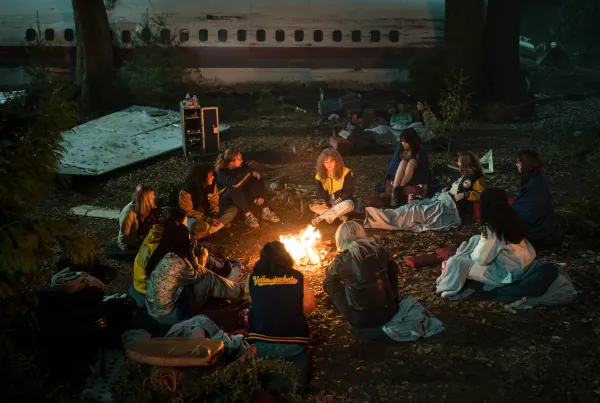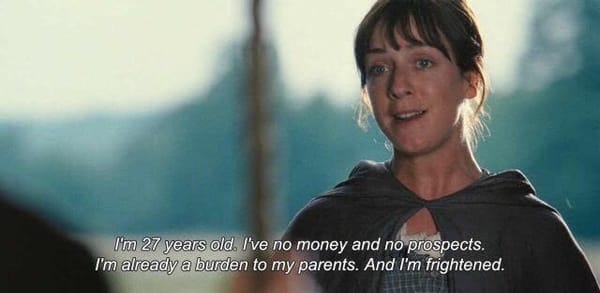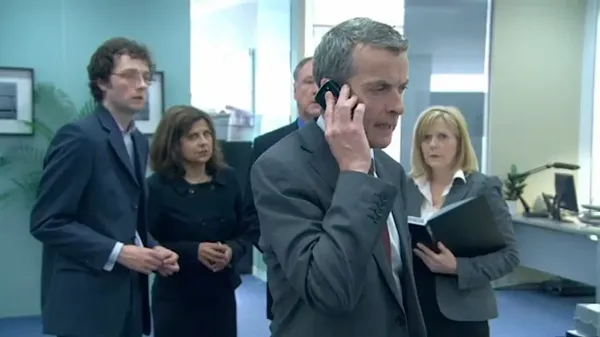Scriptnotes Recap: Episode 682, The Second Season with Tony Gilroy
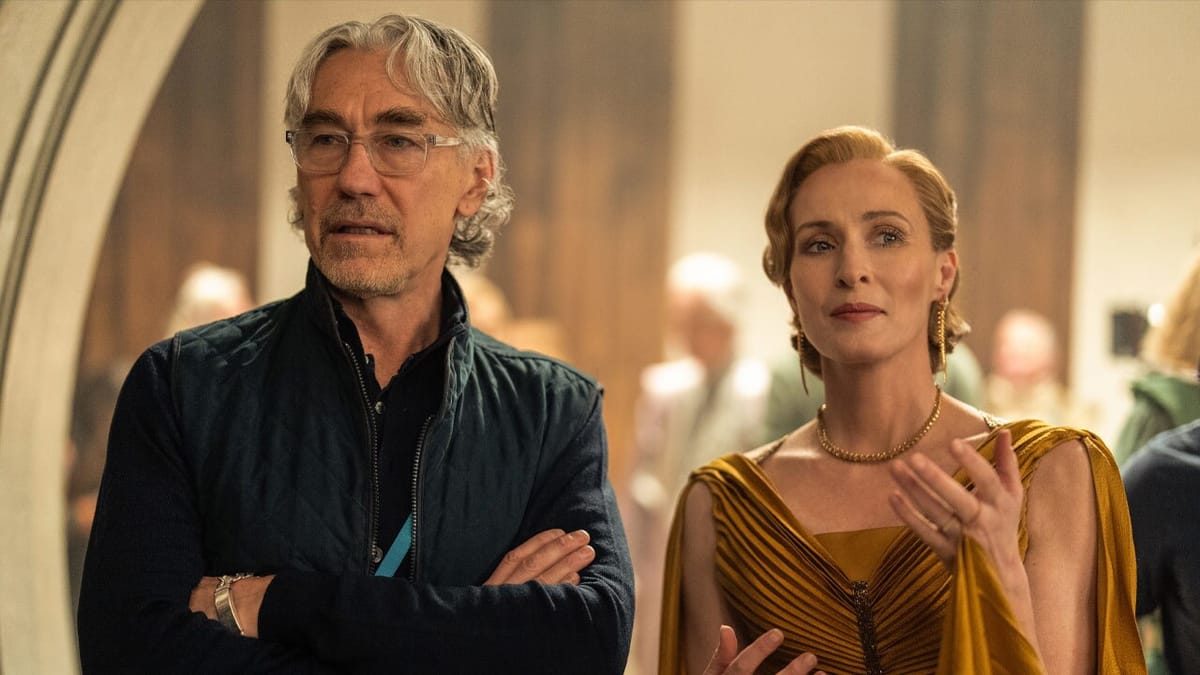
Tony Gilroy recently stopped by Scriptnotes to talk about the new season of Andor, but mostly what I took away from it is what a badass he is.
Tony has a lot of pride in his work, so his standards are high – which is a quality that many people strive for, but I’ve seen used as an excuse for perfection paralysis or to be a tyrant. Tony is far too deliberate to fall into those traps. He bets on that pride for all of his collaborators, setting lofty goals for himself and everyone he works with (goals more ambitious than he knows they’ll be able to achieve), does his best to set everyone up for success, and then is able to relish the joy and satisfaction of pulling it all off as a team.
And he was a genuinely good person! He showed up early! He was kind and generous and self-effacing! He was so refreshingly honest about everything, which is rare from people tasked with leading a project in a massive franchise like Star Wars. For instance:
How he found Andor’s structure
Tony: I had no clue whatsoever what I was getting into. I threw together a five-day writers’ room. I was going to be directing three episodes. I was prepping them. I was casting them. I was half-assed watching the other scripts come in. Had we proceeded on that schedule, it would have been a trade story disaster. COVID came in and everything slowed down and stopped and reset. I reoriented my job on the show. I decided not to direct. I realized where the priorities were.
As we began to crawl back into the process, there was time to get our footing and for me to figure out what I needed to be doing and how to make the show what I really hoped it would be.
We had promised that we were going to do five seasons of this show. It was going to be one season per year. Talk about delusional.
Diego and I got up in Scotland. I remember the conversation where we just sat down in the backyard in Pitlochry at this hotel with a scotch and just said, “We’re so fucked. We’re just so totally fucked. What are we going to do?”
The answer was mystically already in front of us. Our show was organized around blocks of three, which is this European system. You’re looking for systems that’ll help you organize things. Survive, really.
It was like, “Oh, my God. We have four years to cover. We have four blocks.” I remember going back to the room and going, “What if I did a year per block? Would Disney go for that? What would Kathy say? How would we do it?” That was a crucible moment where we really figured out what to do.
Each writer took a block. You get a movie. You get these three. We weren’t Calvinist about it in the first season. In the second season, we are jumping a year each time.
Then the idea became refined as I started to sketch it. I’m not going to come back and stay a month or dick around. When we come back, we’re coming back for three days each time. We just drop the needle on three days and then we jump a year and come back for three days. There’s this abyss of negative space that’s in between. Then my desire, my goal, is to not have any exposition whatsoever. None of the Chekhovian, “As you know.” “As, of course, you remember, when last we spoke.” What’s the most badass drop we can do and get away with it?
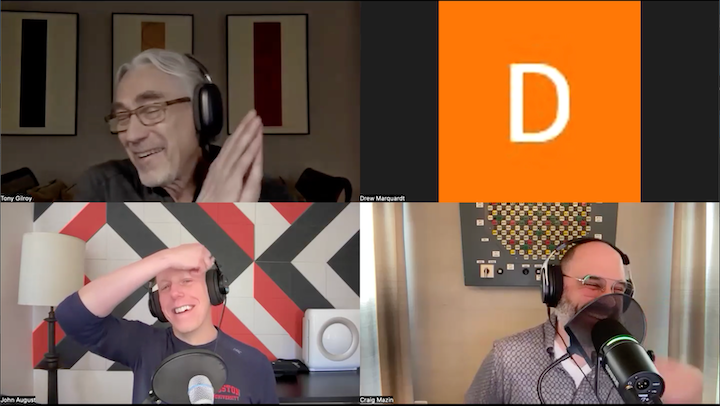
His control and authorship of the series is realized through writing and preparation – not micromanaging:
Setting your team up for success
Tony: I never ever, ever, ever had a writer on the set. Our whole principle is to have the scripts be so prepped, so perfect in every moment of tempo and design, everything’s been tucked away, so that these people can go to set every day and swing.
As a director and as a final-cut director and as a protective director, the idea of having me or somebody else watch over-- I want them to know exactly what they’re supposed to get, what the protein is every day, what we’re going for, but I want them to swing when they go to work.
Our system was developed around that. A very scientific, “Let’s get a perfect set of drawings.” To a level I would never take a movie. I’ve never taken a movie that far. This is hundreds of people, but so detailed. That’s what we evolved into. It’s a writing system.
I wrote from the very first memos to Lucasfilm straight through until the final ADR mix session. I’m writing every single day.
We shot 1,500 pages of script, right? We only lost one scene in the entire thing that we didn’t use for the cut. The only thing we ever re-shot was the first sequence in the very first episode. Essentially, we re-shot it because we wanted to give the directors the balls to swing away. They were too afraid to swing. It’s like, “Dude, you got to go for it. I don’t need coverage. I need a movie here, man.”
It is the most maximal, imaginative, immersive thing that I lived in for five years because when I say “writing,” I’m not just talking about the dialogue or the scenes. I’m also talking about all the dizzying, really almost hard-to-comprehend amount of design work that has to go into the show.
There’s places where I will delegate. Obviously, to the directors, I delegate on the day. Every now and then, the phone would ring at 4:30 in the morning and I’d have to do something, but very, very rarely. Mostly, it’s me getting up at six o’clock in the morning and going through dailies from yesterday and being astonished at how cool these directors are blocking. “Holy shit, look what they did. How did they know how to--“ because they don’t have to worry about the script when they get to the set.
And he was happy to be real about the challenges he faced along the way:
Buyers remorse
Tony: The first year when I was in London pre-COVID, I began to have just the worst buyer’s remorse. Epic every morning, “What have I done? I’ve fucked my life. I shouldn’t have done this.”
When COVID came, I thought, “You know what? Thank God. That will kill the show.” I was very, very unhappy when the phone calls started coming. Then I was like, “Well, I’m not coming back to London to die for this show.” “Well, I’m not going to direct anymore.”
You have your pride of work. That never goes away. You’re just going to do the best you can all the time, but it was with horrible, horrible doubt. It really wasn’t until we started shooting and stuff started coming in and it started to pull together. My feelings changed as we did the first season. I’m only doing two seasons, though.
Knowing the ending, always knowing the ending, it’s a freeing thing. It’s a liberating thing to know where the end of the road is.
The strike gave him fresh eyes
Tony: The irony of that was that if you had asked me at any point during that year, “What’s going to be the most epic moment of your year?” I could have told you in September, without any labor issues on the horizon whatsoever, “Oh, my God. Around March or April, I’m going to finish the final rewrite on the final script.” I literally finished the final page turn about six days before the strike. It rhymed with that just by accident.
What it did do is, I was not allowed to see the show for six months.
They kept going. I had only seen one cut of one rough cut of the episode. In September, when the strike was over, my brother John came to New York and brought me all 12 episodes in extremely rough form, with temp crap and all the IOUs and temp music and sloppy shitty all over the place, but 12.
I was extremely nervous. I spent two days and I watched them. I had the experience that one always speaks about in an editing room. On every movie I’ve ever been on, there comes a moment where you go, “God, I’d pay $50,000 if I could see my movie for the first time...”
I got to watch all 12 episodes on a run with the freshest eyes and smart fresh eyes that you could possibly ever have. I generated 100 pages of notes, but they were notes that were like I had developed a new way of thinking about things in a way where I’m really into the calories that the audience spends on information.
If the audience is worried about any bump in the road over here or if that’s confusing when they come in or something takes my energy away and the audience is missing the protein that I have in there, I want to smooth that down or get rid of it. I was so much more in tune with that in a way that I never would be holistically before.
Tony is a model leader, and Andor is proof that great leadership brings begets great results. It's an inspiring conversation with one of the best writers of all time. If you haven't listened (and this whole post hasn't convinced you), don't worry – this one is going in the Scriptnotes hall of fame.
Listen to the full episode here or anywhere you get your podcasts.
For our entire catalog of conversations like this, sign up to become a premium member at Scriptnotes.net

